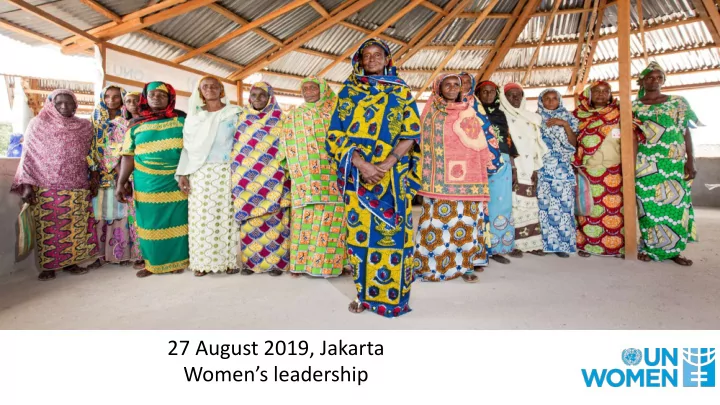

27 August 2019, Jakarta Women’s leadership
Wh What we e know: • In humanitarian and crisis settings: situation for women and girls deteriorates • Women are first responders, agents of change, women’s organisations are active • Limited funding for women’s organisations and gender often seen as not ‘life saving’ (UNFPA: only 1 % of funds go to GBV protection) • Limited access decision-making on humanitarian and crisis response • Ongoing changes!
Grand Bargain (2016) and Localisation • 2016 at WHS: 30 donors and aid organisations commit to change working practices • LOCALISATION: commitment for increased institutional support and direct funding for local and national responders • Aim: 2020: 25% of budget to local actors • 2016: initiative to set up informal Grand Bargain Friends of Gender group • 4 workstreams identified as key for women: cash, needs assessments, participation, LOCALISATION
Key aspects for the localization agenda •Reinforce not •Capacity replace local strengthening capacities and considerations in systems partnership agreements •Institutional transformation •Remove barriers to Institutional for WROs and equal partnerships Partnership WLOs (scale up strengthening engagement and interventions) Financing Coordination •Greater use of •Support and tools (including complement national pooled funding coordination mechanisms) that mechanisms increase •Include national and assistance local actors (with delivered by local focus on WROs and and national WLOs engagement in responders HCT)
What UN Women and FoG achieve: Technical guidance notes (summary LOCALISATION) • Research on transformative gender responsive • localization and participation –community perceptions (Jordan, Bangladesh, Uganda and Colombia) Global meetings/Global Dialogue • Ongoing engagement in operationalization of • workstream work plans (enhance gender dimensions) Global advocacy (GB Annual Meeting) • Accountability through gender • indicator integration in the GB Annual Reporting Format
Asia-Pacific regional Consultation • Ongoing initiatives: International, regional, national/ local level • Also beyond GB (Feminist humanitarian policy, Leadership, IASC Gender Policy and Accountability Framework) • Workstream on Localisation: regional conferences (Addis Abeba, Amman, Jakarta) • UN Women, FoG and co-hosts Oxfam, Care and OCHA: pre-consultation with WOMEN’s GROUPS • Aim: bring women’s organisations together for joint thinking and recommendations from their practices • For Regional Conference on Localisation of Aid (27-28 August) and TGNs
Best practices (examples) • Donors to internally track direct funding to women’s organisations and partnerships/ improve FTS indicators • Engage women’s groups in committees that set criteria for partner selection • Include women’s organisations in the humanitarian coordination processes • Invest in the capacity of women’s organisations (also with flexible multi year funding) • Promote long-term equal partnerships • Women’s organisations linking up for better coordination/advocacy and scale
Recommend
More recommend